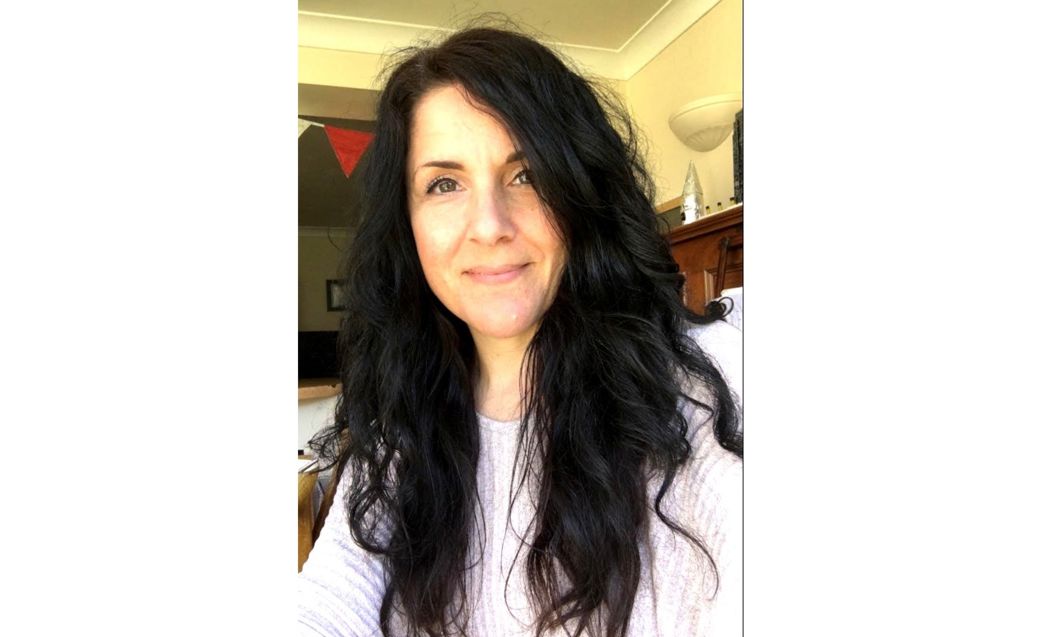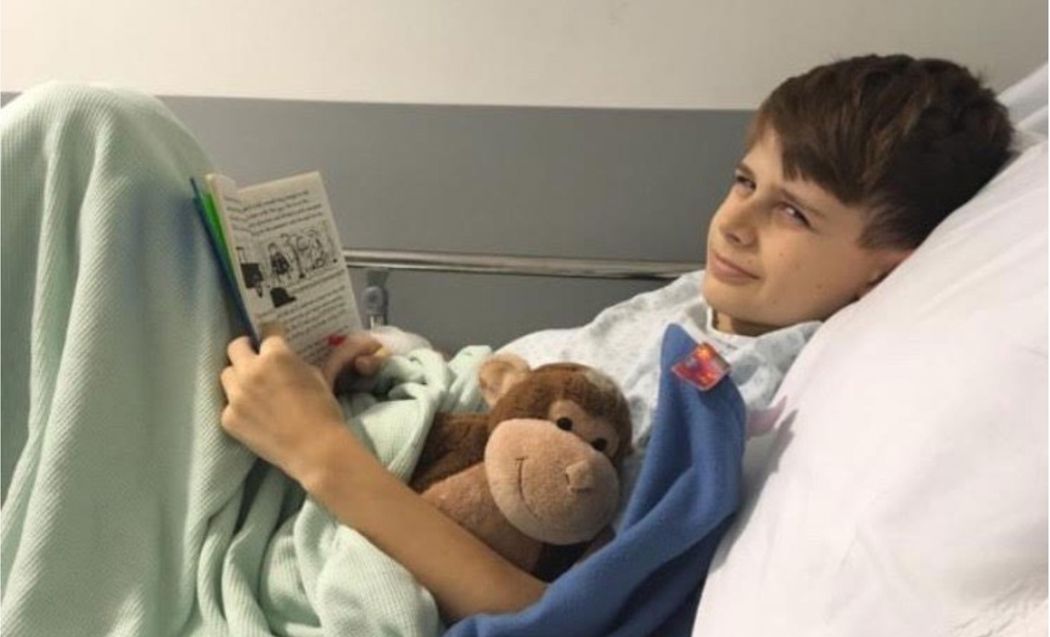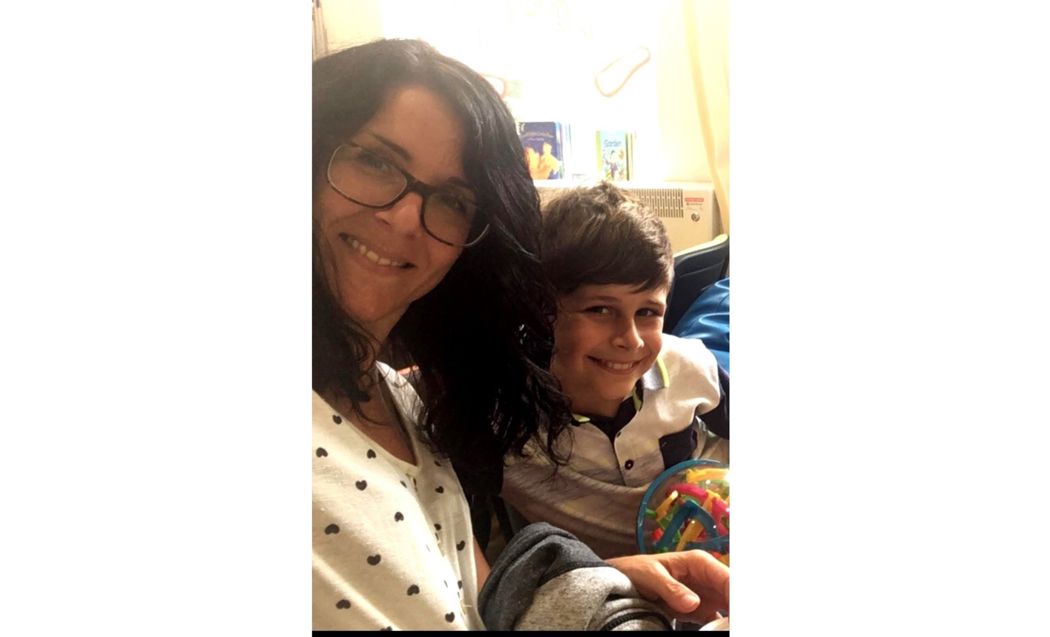Jen is mum to Max, who was diagnosed with Crohn’s disease 2 ½ years ago, aged 10. She is also an IBD patient, having lived with ulcerative colitis since the age of 10. Her IBD journey began many years ago...
I don’t really remember a time when I went from being well, to being unwell.

It must have been a fairly gradual change. I just remember spending more and more time in the toilet, particularly before school in the morning. In fact, I think that if it hadn’t been for parental intervention, I likely would have stayed there most of the time (I would sneak a book in with me if I could!). I felt safe there. I was struggling with a feeling of urgency that never seemed to go away, with constant diarrhoea, I was losing blood (it seemed like gallons of it to my frightened mind), was also losing weight, and felt constantly exhausted and drained. I was ten years old.
Memories of my diagnosis are vague; in my defence, we are talking 30 years ago!
I was treated in the Gastroenterology department in my local hospital, alongside adults of all ages. I don’t remember ever seeing any other children of my age there, though I’m sure there must have been. I recall endless incomprehensible conversations (all of which were directed at my Mum), intrusive examinations, blood tests and procedures. I can remember feeling frightened, overwhelmed, embarrassed and ashamed, and perhaps most clearly, feeling a complete loss of control.
And so, after a long-forgotten period of time, I was given my diagnosis. At the time, I was simply aware that it was Ulcerative Colitis. I now know it to be Proctitis and Distal Colitis. I was told after my first colonoscopy that it was moderate UC, tailing off to mild, and that I was ‘fortunate’ because of this.
I didn’t feel very fortunate, and the symptoms that I was struggling with didn’t feel very mild to moderate. However, I was a small child being told this by important, highly trained adults, so of course, I didn’t question it.
I grew up understanding that bowels, toilet habits and poo are not ‘nice’ subjects for discussion, quite often those words were spoken in hushed tones! This, along with my newly acquired belief that I was ‘fortunate’ and so shouldn’t make a fuss, was the beginning of my almost thirty year journey of embarrassment and shame, and endless attempts to downplay or hide my condition and symptoms. It never occurred to me to admit that my ‘normal’ was quite different to other peoples ‘normal’.
My symptoms were brought under control fairly quickly with rounds of steroids, and my first experience of moon face and other associated symptoms; this resulting in active avoidance of oral steroid treatment wherever possible in the future! From then on, I began taking, and have been since (with the odd laziness break), mesalazine (Asacol). I needed to take iron tablets as I was severely anaemic. Things improved, though I was rarely symptom-free (I often wouldn’t admit that to anyone though, for fear of repeat colonoscopies and rounds of steroids). I developed a need to know at all times that there was a toilet available, usually needed quick access to said toilets, and coped with bloating and gas, and the pain that resulted from holding that gas in!
I became a quietly anxious child, with so much to cope with, but unwilling to share how I was feeling (remember, I was fortunate!). As I grew, I developed painfully low self-esteem, and began to blame myself for being unwell. I felt that I was battling against a body that was letting me down.
High school was really tough. When I was flaring, which seemed to be most of the time at a level which I was learning to cope with, I would need to make repeated trips to the toilet, something which didn’t go down well with my teachers or my fellow students (eventually, and to my great embarrassment, school were informed of the nature of my condition, after a particularly awkward history lesson where I had to leave to use the toilet twice, and was refused permission a third time).
When I reached the toilets, quite often I was unable to go anyway, but just couldn’t shake that feeling of urgency. Sometimes I didn’t quite make it, and would have to set about clearing up accidents. I never admitted this to anyone. On various occasions I would return to class without underwear, much to my well-hidden shame. And when I did need to go, often I would find myself sat for long minutes, holding on until the toilets were empty – my fragile self-esteem couldn’t risk the chance that someone would hear me. Or smell me!! I vividly remember sitting there, eyes closed, telling myself that I was disgusting, hating that I couldn’t control myself like other people could. Sometimes several times during the day. By the early afternoon, I would invariably have quite severe stomach pain from the gas that I had been holding in throughout the day. Again, I would always keep this to myself.
School trips, long coach journeys, sleep overs, all the exciting things about school were accompanied by high levels of anxiety for me.
I took part in a French exchange aged fourteen, which involved staying with a lovely French family in their home. Of course, my anxiety was high, and so I flared. The feelings I experienced, whilst trying to explain, in not even quite GCSE level French (they didn’t speak more than few words of English), why I was in and out of their toilet throughout the night, still come back to me with amazing clarity.
It makes me really sad to remember all this now, and the hard time I gave myself. I had no one that I felt I could talk to about this, I didn’t know anyone else with IBD. And of course, I was fortunate!
As I grew older, and began to have more control over my life, managing my condition was a little easier, although by that time I had developed chronic anxiety, had very low self-worth and was overwhelmingly risk-adverse. It didn’t occur to me that any of these might be attributable, at least in part, to my condition. I just saw it as a long list of my own failings. I sought help on various occasions when the anxiety was overwhelming, was prescribed anti-depressants, and a bit of CBT counselling. But no one ever made the connection, helped me to understand why I might be experiencing these difficulties.
So life moved on, I coped with my ‘normal’, had accepted that this was how life was meant to be for me. Over the years, I had three beautiful children. Then a few years later my marriage ended. I knew that I was unhappy, and that something needed to change, but I didn’t know what to do about it. Then one day I met a wonderful woman (who is now a very dear friend) who encouraged me to seek counselling.
At this point, I still had no idea that a large proportion of what I was struggling with could be directly connected to the impact of my IBD. Gradually, over many months, this started to become clear to me.
At the same time, about 2 ½ years ago, my middle child started to become unwell. Max has a diagnosis of Autistic Spectrum Condition (high functioning), and already displayed a range of unusual behaviours. When he started sitting down on the floor at every opportunity – in the shops, out walking, on the playground in the rain, I just thought it was another to add to the list! But then I noticed that he was looking thinner, had developed dark shadows under his eyes, and seemed tired all the time.

Then he began to complain of a ‘bubbly tummy’. And visiting the toilet more often. And I knew.
After a quick appointment with our GP, who readily accepted that I knew what I was seeing in Max, we were sent to the hospital. The doctor examined Max, then suggested that we should give it three months to see how he got on. I was seriously concerned that three months would be far too long, considering how rapidly Max’s condition was deteriorating. Thankfully, we received an unexpected appointment at Addenbrookes Hospital the following week.
The team at Addenbrookes were incredible. Max’s situation was assessed and, after a range of tests and his first colonoscopy, he received his diagnosis. Crohn’s disease. My heart broke briefly.
But then I knew what I had to do.
I had to make sure that Max would never feel the way I had felt. That talking about his condition without shame or embarrassment would be the norm. That he never felt alone.
And so, bowels, toilet habits and poo became a celebrated topic of conversation in our house! Max seemed completely comfortable talking about his condition, and so I encouraged this. Trips to Addenbrookes became an enjoyable ritual, and Max was always happy to see the team. He was incredibly strong. Blood tests, procedures and various medicine changes were dealt with, as were rounds of steroids (and moon face!). When his symptoms weren’t controlled by steroids and Azathioprine, it was decided that the next step was biologics (Adulimumab). Again, Max adapted to regular injections (he now self-injects) and his symptoms were quickly brought under control. He started growing again!
Max has been doing really well since then, and as far as I can tell, his emotional health seems good, with little impact from his IBD journey so far.
Addenbrookes, and his school have been extremely supportive, and last year Max participated in the making of information videos produced for CICRA, talking about his experiences. Watching those videos being shown for the first time at the family’s day in London, was an emotional point for me. In that moment, I felt certain that Max would never struggle in the same way I did.
A few months ago, I was inspired to focus more upon educating myself about my condition. I began to learn more about how my body works, and what an incredible thing the digestive system is! I’ve become aware of the impact that IBD can have on a person’s emotional wellbeing, have learned about, and taken on positive lifestyle changes, in order for my body to be in the best place it can to deal with the challenges it faces. I feel that I’ve stopped fighting against my body, and instead am learning to love it. To take back control of my own health.
I have also been encouraged to see the value in my journey; that perhaps I can use my experiences to help others. I’ve found the confidence to begin training to become a psychotherapeutic counsellor, and alongside CICRA, am offering emotional support to newly diagnosed IBD patients and their families. I found my purpose.
Above all, I have begun to appreciate the true power of connection. Of being heard. I’m not ignoring the possibility that things may get tough again. I’m ready for that should it happen. But would I change my journey? Absolutely not. Now, I truly feel fortunate.
Jen's IBD journey has inspired her to offer her support, encouragement, and a friendly listening ear to families who are living through challenging IBD experiences. Email our support team, if you would like to be put in touch.

